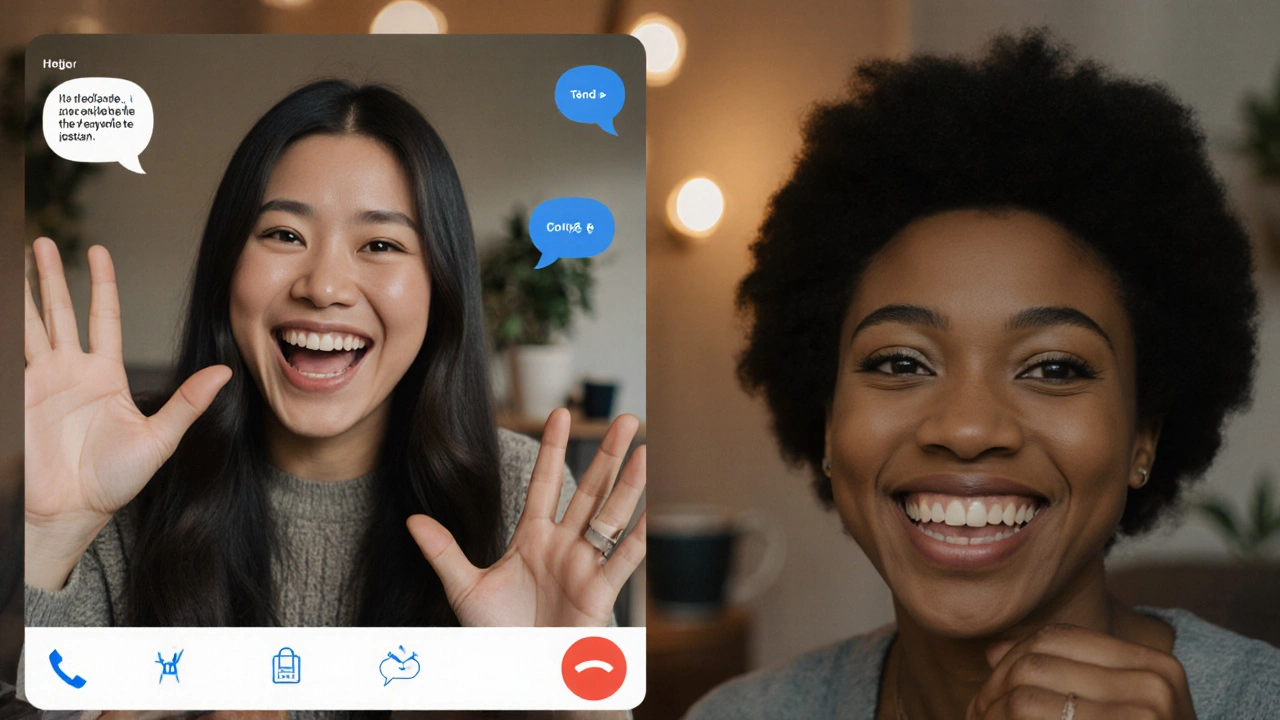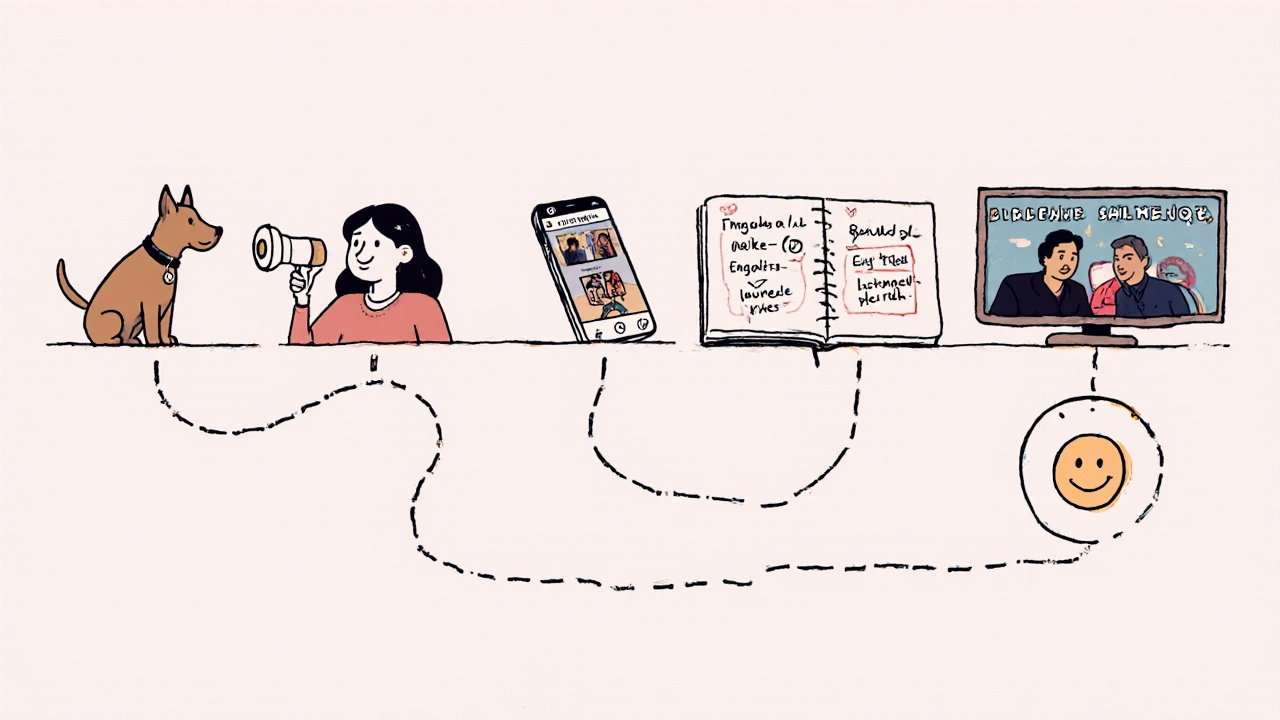You’ve practiced grammar. You know thousands of words. You’ve watched movies, listened to podcasts, even taken online courses. But when someone asks you, "How was your weekend?", your mind goes blank. Your tongue feels heavy. You stutter. You switch back to your native language. And you wonder: Why do I struggle to speak English fluently?
You’re not broken. You’re just training the wrong muscle.
Most people think fluency is about vocabulary. It’s not. Fluency is about speed, confidence, and automaticity. Think of it like driving a car. Knowing all the parts of the engine doesn’t make you a good driver. What matters is how fast you can shift gears without thinking. That’s what speaking English fluently feels like-no translating, no pausing, no fear.If you’re stuck, it’s not because you’re bad at English. It’s because you’ve been practicing the wrong things. Here are the seven most common reasons people can’t speak English fluently-and exactly how to fix each one.
1. You’re translating in your head
This is the #1 silent killer of fluency. You hear a question in English. Your brain instantly translates it into your native language. You think of the answer in your language. Then you translate it back into English. By the time you speak, the conversation has moved on.It’s like trying to type a message by handwriting it first, then copying it onto a keyboard. Slow. Exhausting. Error-prone.
How to fix it: Start thinking in English-starting now. Don’t wait until you’re "ready." When you’re alone, describe what you’re doing out loud in English. "I’m making coffee. The water’s boiling. It smells good." Don’t worry about perfect grammar. Just keep the stream going. After a few weeks, you’ll notice your brain starts skipping the translation step.
2. You’re afraid of making mistakes
Fear isn’t just an emotion. It’s a physical barrier. When you’re scared of sounding stupid, your body tenses up. Your voice shakes. Your words get stuck. You avoid speaking altogether. And the less you speak, the worse you get.Here’s the truth: Every native speaker makes mistakes. They say "I seen" instead of "I saw." They mix up "they’re," "there," and "their." They pause. They restart. They use filler words like "um" and "like."
What separates fluent speakers from stuck learners isn’t accuracy. It’s willingness to be wrong.
How to fix it: Set a daily "mistake quota." Tell yourself: "Today, I’m going to say five wrong things out loud." Say them to a mirror, to your pet, to a language partner. Celebrate them. Each mistake is data. It tells you what to work on next. The more you normalize errors, the less power they have over you.
3. You only speak when you feel "ready"
"I’ll start speaking when I know more words." "I’ll join a conversation when I’m less nervous." "I’ll talk to native speakers when I sound better." That’s a trap. Fluency isn’t a destination you reach after studying enough. It’s a skill you build by doing-messily, repeatedly, inconsistently.Think of it like learning to swim. You don’t wait until you’ve read every book on swimming technique before jumping in. You get wet. You splutter. You swallow water. And then you try again.
How to fix it: Speak before you’re ready. Every single day. Even for 60 seconds. Call a language exchange partner. Record yourself answering one question. Join a free Zoom group for English learners. Don’t wait for confidence. Build it through action. Confidence follows behavior-not the other way around.

4. You’re listening to the wrong material
You’re watching TED Talks. You’re listening to BBC News. You’re reading novels. These are great for advanced learners. But if you’re still struggling to speak, they’re too fast, too formal, too complex.Native speakers don’t talk like news anchors. They use contractions, slang, interruptions, and incomplete sentences. "Wanna grab coffee?" "Kinda tired, but yeah." "So, anyway…"
If you only listen to polished, slow, textbook English, your brain doesn’t learn how real conversations flow.
How to fix it: Switch to authentic, everyday content. Watch YouTube vloggers, TikTok creators, or sitcoms like Friends or The Office. Listen to podcasts like "The Daily" or "All Ears English"-they speak at natural speed, with real pauses and reactions. Focus on how people connect ideas, not on every word they say.
5. You’re not practicing speaking with feedback
Practicing alone isn’t enough. If you never get corrected, you’ll keep repeating the same mistakes. Maybe you mispronounce "th" as "s"-"dis" instead of "this." Maybe you drop articles: "I go store" instead of "I go to the store."These small errors add up. They make you sound unnatural-even if your grammar is perfect.
How to fix it: Get feedback from someone who can help. Use apps like HelloTalk or Tandem to chat with native speakers. Ask them: "Did that sound natural?" Record yourself speaking and compare it to a native speaker saying the same thing. Pay attention to rhythm, stress, and intonation. Fluency isn’t just about words-it’s about how they sound together.
6. You don’t have a speaking routine
You study English on Sundays. Or when you have free time. Or when you feel motivated. That’s not a system. That’s luck.Fluency doesn’t come from occasional practice. It comes from daily habits. Like brushing your teeth. Like checking your phone. Like drinking water.
How to fix it: Build a 10-minute speaking habit. Every morning, right after you wake up, speak for 10 minutes. No apps. No books. Just talk. Describe your dreams. Talk about what you’re going to eat. Complain about the weather. Don’t stop. Don’t pause. Don’t edit. Just keep going. After 30 days, you’ll notice a shift. Your mouth will start moving before your brain finishes thinking.

7. You’re measuring progress wrong
You think fluency means speaking without mistakes. Or knowing 10,000 words. Or understanding every word in a movie.That’s not fluency. That’s perfectionism.
Real fluency means you can express your thoughts clearly-even if your grammar isn’t perfect. You can handle misunderstandings. You can ask for clarification. You can laugh at yourself. You can keep talking even when you’re unsure.
Here’s a better way to measure progress: Instead of asking, "Am I fluent yet?" ask: "Did I say what I wanted to say today?"
If the answer is yes-even once-that’s progress. Track that. Celebrate that. That’s the real sign you’re getting better.
What to do tomorrow
Don’t wait for the perfect moment. Don’t wait for the perfect course. Don’t wait until you feel confident.Here’s your simple plan:
- Speak out loud for 10 minutes-no script, no fear.
- Record yourself saying one sentence: "I’m getting better at speaking English every day."
- Send it to a friend, a language partner, or just play it back.
- Notice how your voice sounds. Notice how your body feels.
- Do it again tomorrow.
Fluency isn’t a gift. It’s a habit. And habits are built one small, messy, brave action at a time.
Why can I understand English but not speak it?
Understanding English is a passive skill. Speaking is active. You’ve trained your ears to recognize words, but not your mouth to produce them. It’s like knowing how to ride a bike by watching videos-you haven’t actually gotten on the bike yet. The fix is simple: speak more, even if it’s awkward. Your mouth needs practice, not more listening.
How long does it take to speak English fluently?
There’s no fixed timeline. Some people start speaking clearly in 3-6 months with daily practice. Others take years because they wait for perfection. The difference isn’t talent-it’s consistency. If you speak for 10-15 minutes every day, you’ll see real progress in 90 days. Fluency isn’t about speed. It’s about showing up.
Should I focus on pronunciation or grammar first?
Focus on being understood. Perfect grammar won’t help if people can’t understand you because you say "th" like "s." But perfect pronunciation won’t help if you say "I go store yesterday" and no one knows what you mean. Start with clear pronunciation of key sounds (th, v, r, l) and simple sentence structures. Grammar comes later-after you’re already talking.
Is it too late to become fluent if I’m older?
No. Research shows adults can learn to speak fluently just as well as younger learners-they just learn differently. Adults are better at understanding patterns and rules. The myth that kids learn faster is true only for accents. For fluency, consistency matters more than age. Many people in their 40s and 50s become confident English speakers by speaking daily, not by studying more.
What’s the best app to improve speaking?
There’s no single "best" app. Apps like ELSA Speak or Speechling help with pronunciation. HelloTalk and Tandem connect you with real people. But the most powerful tool is your own voice. Use apps to support practice, not replace it. The moment you start talking to a real person-even if you’re nervous-is the moment real progress begins.
Can I become fluent without living in an English-speaking country?
Absolutely. Thousands of people in Toronto, Delhi, Tokyo, and Berlin speak fluent English without ever moving abroad. What matters isn’t location-it’s exposure and practice. You can create immersion by changing your phone’s language, watching English shows daily, joining online conversation groups, and speaking out loud every day. Environment helps, but effort decides.
